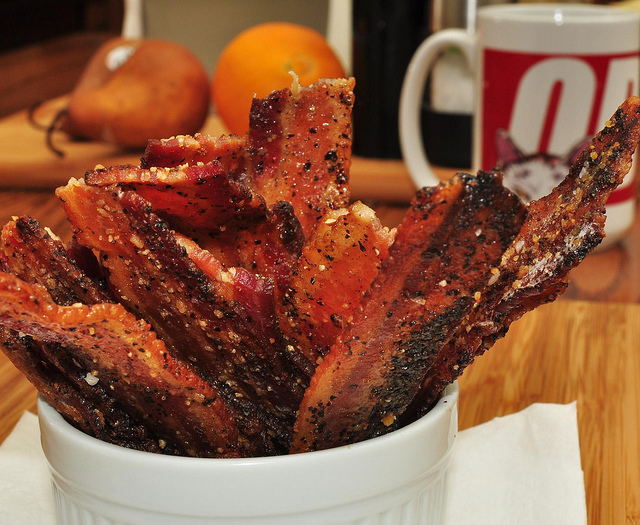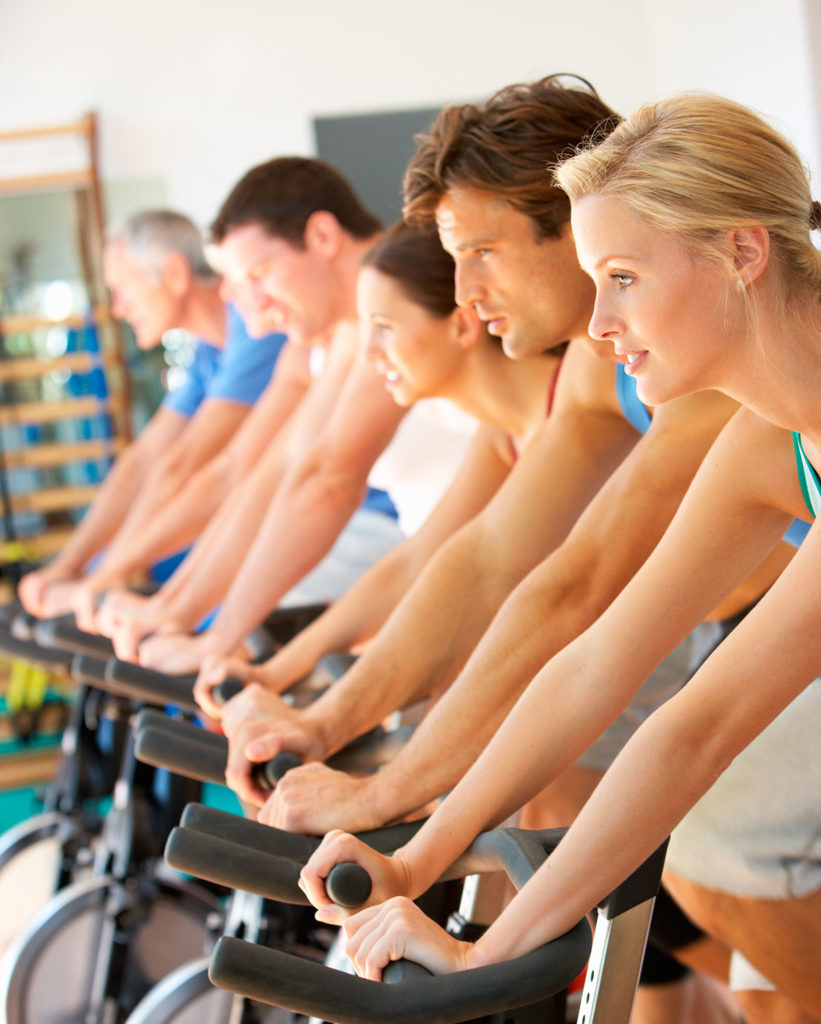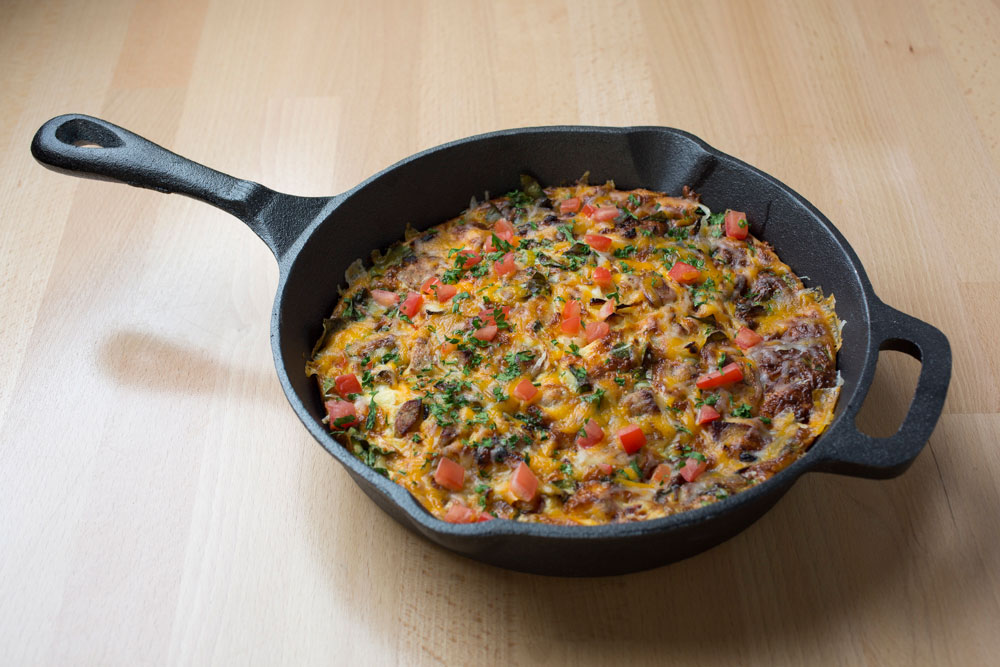Archive for January 2016
Turkey Sausage & Tomato Frittata
After 11 successful seasons of his Food Network show Restaurant: Impossible, chef Robert Irvine is shifting his attention from struggling restaurateurs to everyday folks struggling with health and fitness goals. His answer to those stuck in a rut is his new book, Fit Fuel: A Chef’s Guide to Eating Well, Getting Fit, and Living Your Best Life (Irvine Products 2015), which is a distillation of his lifetime of training, infused with his unique brand of tough love.
Read MoreHow Much Processed Meat Can We Safely Eat?
Question: I understand that too much processed meat isn’t healthy, but how much can I tell my clients they can safely eat?
Answer: It has been known for some time, and was confirmed in a report from the World Health Organization last October (Bouvard et al. 2015), that processed meats increase the risk of colorectal cancer more than unprocessed meats. Processed meats are also known to increase risk of heart disease and diabetes.
Read MoreThe Happy Meal Effect: Can a Prize Motivate Better Choices?
It’s becoming clearer that unlocking the complexities of human behavior, especially food motivation, can impact good and poor health. In a profound paradox, who would ever have thought the McDonald’s Happy Meal model could be so instructive?
Researchers led by Martin Reimann, PhD, of the University of Arizona’s Eller College of Management, set out to see whether people would opt to eat less if food were paired with a nonedible bonus—comparable to a nonfood toy in a Happy Meal.
Read MoreThe Hidden Cool-Down
The biggest challenge with cool-downs is the notion that they are a waste of time. If you typically don’t convey how important it is to recover before exiting a cycling class, take time in the warm-up to make this clear. It helps, but even if you drill the point into participants’ heads in class after class, chances are there will still be riders who don’t take the time to wind down. This is why you may have to “hide” the cool-down as if you were feeding a child his least favorite vegetable pureéd into a more palatable sauce!
Read MoreWhich Is Better: A Live Class or a Virtual One?
Technology is rapidly changing how the fitness industry delivers services. In addition to wearables, apps and countless other options, technology offers—at the touch of a screen—almost any type of prescheduled or on-demand group exercise class at any venue that has Wi-Fi. This is
virtual fitness,
exercise programming that is carried out, accessed or stored by means of a computer, especially over a network.
Read More“What are the advantages and/or disadvantages to wearing workout gloves?”
The advantages to wearing weightlifting gloves include eliminating the need for chalk, eliminating calluses and preventing sweat from diminishing grip.
The disadvantages are that gloves can make gripping harder because they add girth to whatever you are gripping; gloves can get stinky if not allowed to dry out properly; and gloves can be difficult to get on and off for people who wear them intermittently in a workout. In addition, they can be expensive compared with more modern silicone or neoprene grip barriers.
Read MorePerforming Under Pressure
Have you ever lost your train of thought or been unable to find your flow while doing something that normally is very easy for you? Have you ever been tired all of the time, no matter how much sleep you were getting? If you answered yes to one of these questions, then maybe you were choking under pressure. When you read my story just below, you’ll learn what choking is and what factors lead to it—so you can avoid it!
Read MoreAdaptable Program Design
A perfect match. Sometimes, in what seems a stroke of kismet, a
perfect client-trainer relationship begins. Several years ago, Eran, a
longtime dancer for Paul Taylor’s American Modern Dance Company, moved
to Brooklyn in New York City. She had been working with a personal
trainer in Harlem until the commute from Brooklyn became too much of a
struggle.
Oversized Portions, Tableware and Overeating
Bottomless bowls of soup; a self-filling popcorn bucket; big plates versus small ones; and tall versus short glassware. These are all devices behavioral scientists have used to study human consumption habits in an effort to find out what prompts us to overconsume.
Read MoreRECIPE FOR HEALTH: Turkey Sausage, Tomato & Spinach Frittata
After 11 successful seasons of his Food Network show Restaurant: Impossible, chef Robert Irvine is shifting his attention from strug- gling restaurateurs to everyday folks struggling with health and fitness goals. His answer to those stuck in a rut is his new book, Fit Fuel: A Chef’s Guide to Eating Well, Getting Fit, and Living Your Best Life (Irvine Products 2015), which is a distillation of his lifetime of training, infused with his unique brand of tough love.
Read MoreYoung Women Who Self-Weigh Get Depressed and Develop Body Image Issues
For some people, a daily or weekly weigh-in is a practical gauge of where they stand in their efforts to maintain or lose weight. For adolescents and young adults—especially young women—however, it’s not a good idea, say researchers from the University of Minnesota. In fact, it may have negative psychological outcomes.
Read MoreDo the Math: Count Bites to Lose Weight
When it comes to behavior change, creating awareness can be half the battle. We’re well acquainted with counting our steps as a means of monitoring our daily movement habits, so it’s not much of a stretch to understand how counting our bites of food could also prove to be beneficial.
Read MoreHealthy Kitchen Hacks for the Home Cook
Spice Things Up
Toss a can’s worth of chipotle chilis into your blender, turn
them into a paste and store
it in your fridge for adding
a smoky, flavorful taste to everything from meats to veg-
gies. A lot of people equate healthy food with bland food. Add- ing a little kick to everything from your go-to chicken dish to a pot of steamed broccoli can help get everyone excited about even your same-old healthy recipes. The best part? You can add a little or a lot, depending on your audience.
Appetizers
It’s not quite in the same vein as that must-try pop-up restaurant in town, but culinary experimentation in space is definitely edgy. Last August, astronauts aboard the International Space Station grew and ate the first vegetable cultivated in space—red romaine lettuce—as part of NASA’s Veg-01 experiment. “Future long-duration space missions will require crew members to grow their own food, so understanding how plants respond to microgravity is an important step toward that goal,” says a report on www.nasa.gov.
Read MoreEating Just Got Personal
A new study kicks blanket approaches to dietary advice to the curb. Just because your tennis partner can replenish his energy with a fruit smoothie and a bagel doesn’t mean that’s going to work for you. In fact, that same meal may cause your system to crash.
Read MoreFeed Your Mind at the IDEA World Nutrition & Behavior Change Summit
Because your clients need your guidance on more than exercise, IDEA has created a premier 1-day focus (July 16) within the 2016 IDEA® World Convention (July 13–17 in Los Angeles). This day will focus on the power of nutrition, food and behavior change and will open your world to top-line researchers, weight management experts and behavior change specialists.
Read MoreCutting Sugar From Kids’ Diets Has Nearly Instant Health Benefits
After just 9 days of reducing their intake of added sugar, children with chronic metabolic diseases such as high cholesterol and high blood pressure were able to reverse their symptoms, according to a study by scientists at the University of California, San Francisco, and Touro University California in Vallejo. The findings appeared online in the October 27 edition of the journal Obesity (doi: 10.1002/oby.21371).
Read MoreWeight Recommendations for Pregnancy
Giving birth to a healthy child is every expectant mother’s goal. A new study states that a woman’s prepregnancy weight can influence infant mortality.
Read MoreMindfulness May Improve Athletic Performance
n a pilot study conducted at the University of California, San Diego, elite competitive athletes who took
a Mindful Performance, Enhancement, Awareness and Knowledge (mPEAK) training program improved their ability to sense stressful situations without necessarily reacting to them.
Ideal Exercise for People With Chronic Conditions
Tai chi practice can help older adults with heart failure, osteoarthritis, chronic obstructive pulmonary disease and breast cancer to improve strength, balance and posture, according to a research review of 33 studies involving more than 1,500 subjects
(The British Journal of Sports Medicine, 2015; doi: 10.1136/ bjsports-2014-094388).

















